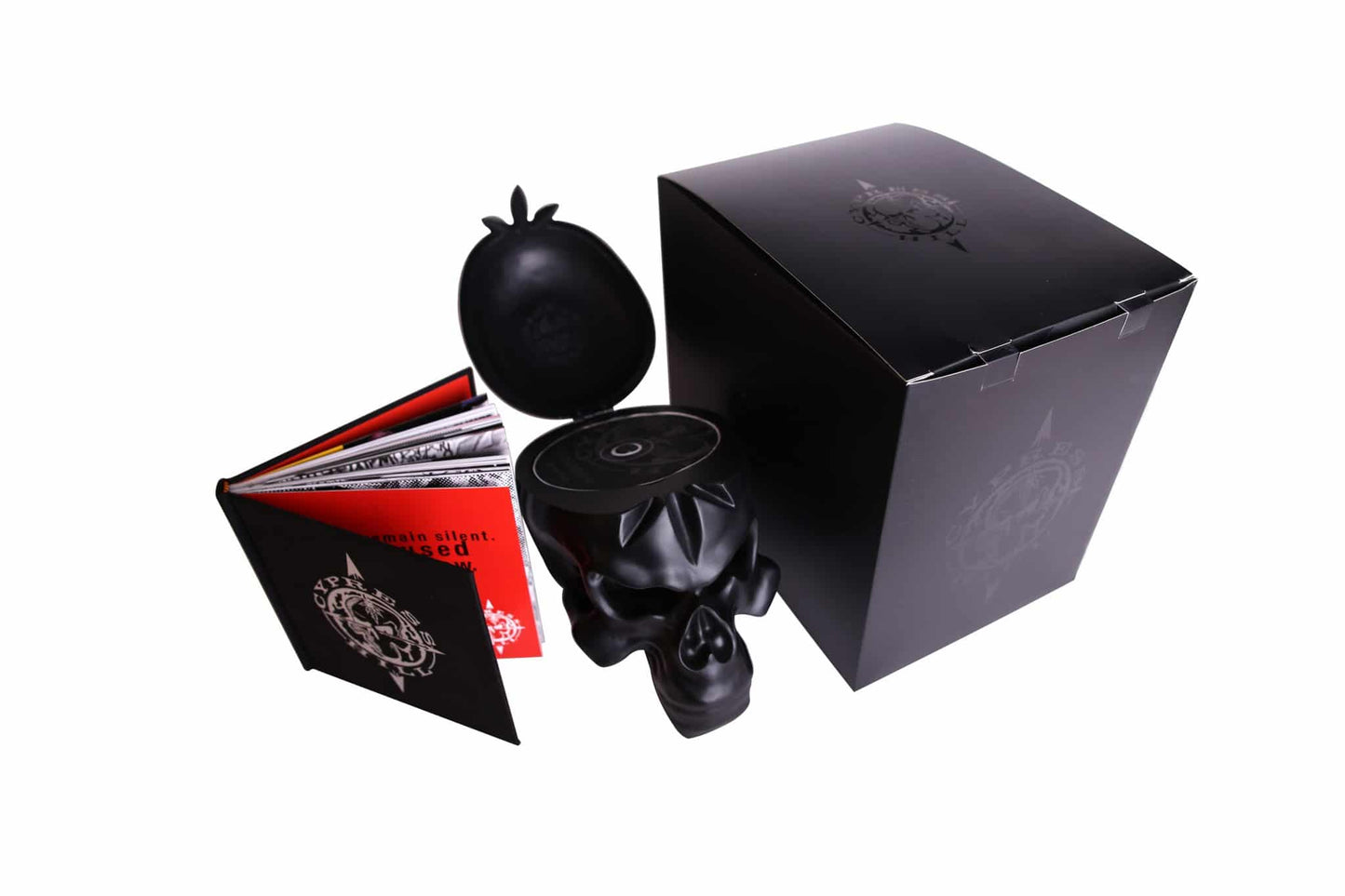Urban World Australia
Cypress Hill – Cypress Hill (25th Anniversary Skull) (2016) (Limited Edition CD + Book + Skull)
Cypress Hill – Cypress Hill (25th Anniversary Skull) (2016) (Limited Edition CD + Book + Skull)
Couldn't load pickup availability
First Edition limited to 1,991
Skull Includes:
- Premium Custom Designed Black Resin Skull (3-D Physical Recreation of the Group’s 1991 Logo)
- Remastered CD
- 100 Page Hard Cover Liner Notes Book
Cypress Hill teamed up with Get On Down to celebrate the 25th anniversary of their 1991 debut with an ultra deluxe "25th Anniversary Skull" reissue.
The entire set is housed in a unique, hard resin black skull - a faithful, 3-D physical recreation of the group's 1991 logo. A CD with remastered audio and a 100-plus page hardcover book are also included. The book features extensive liner notes by journalist Chris Faraone with input from B-Real, Sen Dog and DJ Muggs, and also includes full album lyrics and rarely seen photos provided by the group, as well as press clippings from 1991.
Cypress Hill’s self-titled debut album was hard as nails, with very few pop concessions. There was humor, but it was laced by cackling, homicidal sneering. Not well known outside of the hardcore hip-hop scene at first, faces of the three group members weren’t usually shown clearly in press photos; they preferred the shadows. As their first singles began hitting the airwaves and record racks, the press and music fans started to take notice. From the opening notes of the group’s first single, “The Phuncky Feel One,” to deeper album cuts like “Stoned Is The Way Of The Walk” and “Tres Equis,” it was clear that Cypress Hill was something different. And very, very dope.
The world Cypress Hill espoused was gang-ridden and far from cheery, but they managed to laugh through the pain. Lead rapper B-Real took each fuzzed-out, rock-hard DJ Muggs beat as a challenge, jumping around it like a spark off a joint as it makes its way to the concrete. MC Sen Dog always had B-Real’s back, to bring intensity and a no-bullshit gruffness that made the group both menacing and unpredictable. When they introduced percussionist Eric Bobo to the mix in the early 90s, it brought new dimension to the band, making their live performances one of the most unique and accomplished shows in hip-hop.
Journalist and author Chris Faraone highlights the group’s relationship in the reissue’s liner notes saying, “[By the late ‘80s] the undisputed Cypress unit finally formed. B and Sen realized that their diametric styles - the latter’s deep wrangle, the former’s inimitable high notes - complemented one another righteously. By then Muggs had bangers in the bag, as well as industry experience from a jaunt with the New York duo 7A3. B and Sen waited while Muggs messed with 7A3, and in that time began to build the blueprint for their raucous and weeded no-holds-barred style. Besides getting schooled on industry pitfalls, Muggs had also grown into hip-hop’s most formidable young producer, while straddling the bi-coastal gap.”
Faraone was able to dive in deep with the band for the liner notes, hearing story after story including the particularly interesting tale of their unlikely ’91 radio hit, “How I Could Just Kill A Man.” In the “B Sides win again” story, the group recalls receiving resistance from the label in regards to which single should hit radio first. Initially the label thought “How I Could Just Kill A Man” was too risky and even though the initially featured “The Phuncky Feel One” was one of the album’s strongest cuts, college radio and commercial mix-shows couldn’t resist the dusted, heavy groove of “Kill A Man.” The song – which included a catchy, LA drive-by-inspired chorus – ended up as an unlikely, but powerful double A-sided single that even topped the Billboard Rap charts. More singles would follow, including “Hand On The Pump”; “Pigs”; and “Latin Lingo.” And by the fall of 1991, the album was a full-blown critics’ darling.
When asked about his inspiration to write and rhyme, B-Real got candid with Faraone, saying, “All of the writing in relation to Cypress was based off of experiences, whether direct and living through them or the other guys, or stuff that we [had] seen through other guys in the trenches, when I was living that gangster lifestyle. It was the life we were living that we used as a backdrop.”
Cypress Hill’s debut went gold by the end of 1991 and has since pushed past double platinum status, making it the first album for a Latino-American hip hop group to do so. The album received raves from the likes of Rolling Stone and the Los Angeles Times, saw a #1 Hot Rap Single with the release of “The Phuncky One” and helped the band win Artist Of The Year at the 1992 Source Awards. After 25 years, it should come as no surprise that Cypress Hill is a cornerstone of the group’s live set to this day.
Sen Dog sums up the group’s incredible journey perfectly in the liner notes: “It’s like, ‘Goddammit, we actually went out there and did what we said we were gonna do.’ That’s one of the hardest things to do in the world, and we did it. Every once in a while, I’ll look out at B when I’m on stage and say, ‘We’re still doing it.’ [Our fist] record was respected by everyone in the business, and to meet people like EPMD [back then] and for them to love your shit, those are the things you never forget.”
Share




